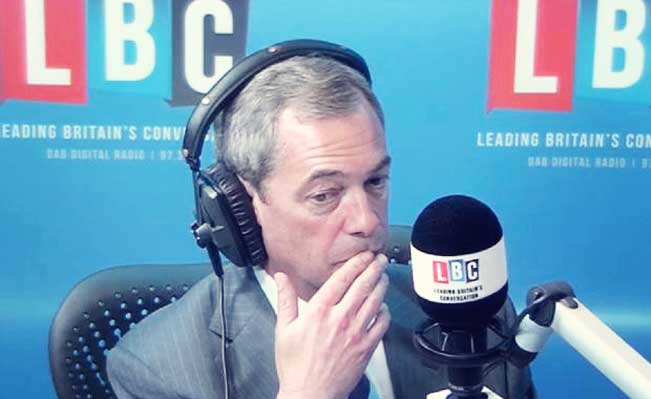 Ukip spin doctor forced to intervene as Farage falters in disastrous radio interview
Ukip spin doctor forced to intervene as Farage falters in disastrous radio interview
Stopping Ukip will require an effective, populist left able to mobilise the anti-establishment mood currently being tapped by Farage argues James Meadway
Nigel Farage’s LBC meltdown has been greeted as turning point in Ukip’s fortunes. After months of soft-soap interviews, Farage was deftly skewered by presenter James O’Brien. “You know what the difference is,” Farage blustered, notoriously, when asked to clarify why Germans were acceptable, but Romanians were not.
Farage and Ukip were rightly condemned as racist in the aftermath, from Diane Abbott to The Sun. Ukip has fed off and ramped up racism, directed in particular against Eastern Europeans, under the guise of “concerns” about recent migration. For a good six months last year, Ukip and parts of the media whipped each other into a lather of consternation over the “floods” of Bulgarians and Romanians expected to descend on the UK when EU controls on their movement were removed in early January. The Westminster parties did close to nothing to break the furore, the Tories pushing for nakedly discriminatory restrictions on benefits, egged on by Labour. If Ukip are now riding high, they are profiting from the poisonous atmosphere generated not only over last year, but over a decade or more of anti-migrant rhetoric from official sources. Piggybacking a single interview, conducted a mere week before the election, to suddenly discover Ukip had problems was hardly likely to break the spell.
Early polling suggests, despite media speculation to the contrary, that it has not. Ukip has slipped marginally in the opinion polls, but remains ahead of the other parties, with Farage himself confident of victory. Closer surveys suggest that the spectacle of the main parties suddenly rediscovering their opposition to racism has, if anything, reinforced Farage’s “anti-establishment” credentials. The sight of (for example) Labour MP Barbara Roche heading up an all-party anti-racism group, when as immigration minister she was notorious for her refugee deportations, looks almost deliberately designed to provoke cynicism. If Ukip is going to be labelled racist – and it should be – that labelling has to come from people and organisations not corrupted by years of pandering to bigotry, and not so obviously part of a political establishment Farage has made such capital out of railing against.
This is Farage’s weakest point. A privately-educated former stockbroker was always an unlikely candidate for anti-establishment hero, however many fags he smoked. A party whose policies include deepening austerity, massive tax cuts for the wealthy, and whose deputy leader advocates the privatisation of the NHS is an unlikely champion of the downtrodden. With both given the kid gloves treatment by much of the media, they can hardly posture as “outsiders”.
Although attention focused on the overt racism, O’Brien’s interview hammered Farage on this, too, when Ukip’s communications director attempted to call time on the debacle. “This is Patrick O’Flynn, Ukip’s director of communications and former political commentator on the Daily Express,” O’Brien parries. “Is this a friend in the media or a member of the political class?” O’Brien explained his approach later, correctly identifying a level of softer Ukip support of the alienated and disenchanted that was quite distinct from those with “truly rancid views” the party attracts.
Labour leader Ed Miliband gets this wrong, focusing only on Ukip’s “Thatcherism” but excusing the racism. An effective anti-establishment alternative to Ukip needs to do both: slamming their 80s throwback economics, but also labelling them, loud and clear, as racist. Only do the first, and you cover for cluster of hardened reactionaries now flocking to Ukip’s flag. Only do the second, and your anti-racism will fail to convince its softer support.
That will require, and soon, an effective, populist left able to mobilise the anti-establishment mood. The Greens, largely ignored by the press, have been quietly gaining in the opinion polls, potentially beating the Lib Dems, and in many places are a credible left alternative to the main parties. Whatever gains Ukip is making, on the core issues of migration and racism, British public opinion is amongst the most progressive in Europe – a low bar to cross, in many cases, but not evidence of an incipient rightwards shift. Ukip voters themselves tend to strongly favour renationalisation. For now, the best use of a vote tomorrow will be to block Ukip wherever, and for decent left candidates where possible.

